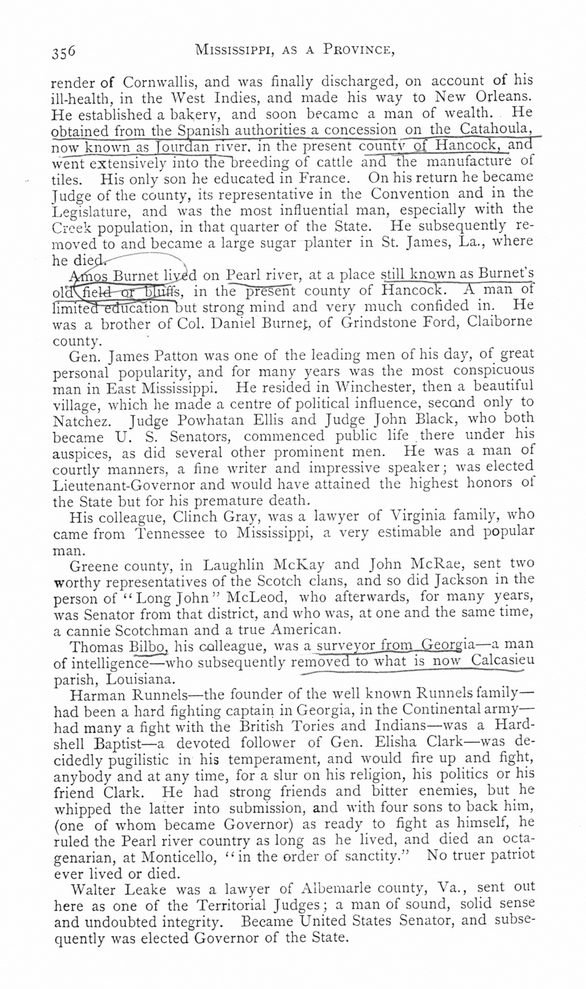This text was obtained via automated optical character recognition.
It has not been edited and may therefore contain several errors.
356 Mississippi, as a Province, render of Cornwallis, and was finally discharged, on account of his ill-health, in the West Indies, and made his way to New Orleans. He established a bakery, and soon became a man of wealth. He obtained from the Spanish authorities a concession on the Catahoula, now known as Tourdan river, in the present countv of Hancock, and went extensively into the~breeding of cattle and the manufacture of tiles. His only son he educated in France. On his return he became Judge of the county, its representative in the Convention and in the Legislature, and was the most influential man, especially with the Creek population, in that quarter of the State. He subsequently removed to and became a large sugar planter in St. James, La., where he diejl.''' Amos Burnet liy^d on Pearl river, at a place still known as Burnet's olH^eM-nir^EIuffs, in lhe~present county of Hancock. A man of limite'Snsfucation Tmt strong mind and very much confided in. He was a brother of Col. Daniel Burnet, of Grindstone Ford, Claiborne county. Gen. James Patton was one of the leading men of his day, of great personal popularity, and for many years was the most conspicuous man in East Mississippi. He resided in Winchester, then a beautiful village, which he made a centre of political influence, secojid only to Natchez. Judge Powhatan Ellis and Judge John Black, who both became U. S. Senators, commenced public life there under his auspices, as did several other prominent men. He was a man of courtly manners, a fine writer and impressive speaker; was elected Lieutenant-Governor and would have attained the highest honors of the State but for his premature death. His colleague, Clinch Gray, was a lawyer of Virginia family, who came from Tennessee to Mississippi, a very estimable and popular man. Greene county, in Laughlin McKay and John McRae, sent two worthy representatives of the Scotch clans, and so did Jackson in the person of ? Long John ? McLeod, who afterwards, for many years, was Senator from that district, and who was, at one and the same time, a cannie Scotchman and a true American. Thomas Bilbo, his colleague, was a surveyor from Georgia?a man of intelligence?who subsequently removed to what is now Calcasieu parish, Louisiana. Harman Runnels?the founder of the well known Runnels family? had been a hard fighting captain in Georgia, in the Continental army? had many a fight with the British Tories and Indians?was a Hardshell Baptist?a devoted follower of Gen. Elisha Clark?was decidedly pugilistic in his temperament, and would fire up and fight, anybody and at any time, for a slur on his religion, his politics or his friend Clark. He had strong friends and bitter enemies, but he whipped the latter into submission, and with four sons to back him, (one of whom became Governor) as ready to fight as himself, he ruled the Pearl river country as long as he lived, and died an octa-genarian, at Monticello, ?in the order of sanctity.? No truer patriot ever lived or died. Walter Leake was a lawyer of Albemarle county, Va., sent out here as one of the Territorial Judges; a man of sound, solid sense and undoubted integrity. Became United States Senator, and subsequently was elected Governor of the State.

Fords Fort Mississippi-Province-Territory-and-State---Page-354